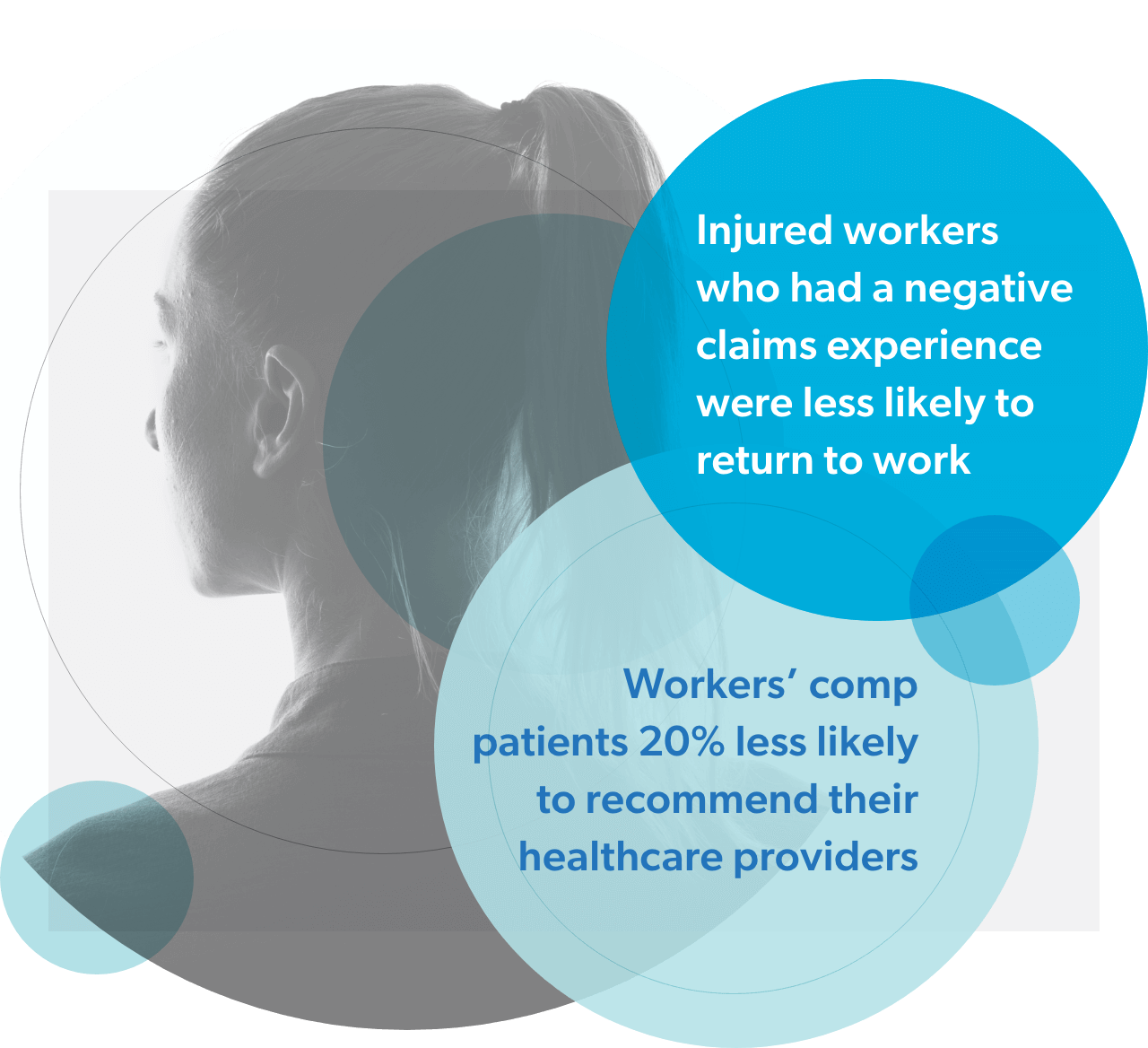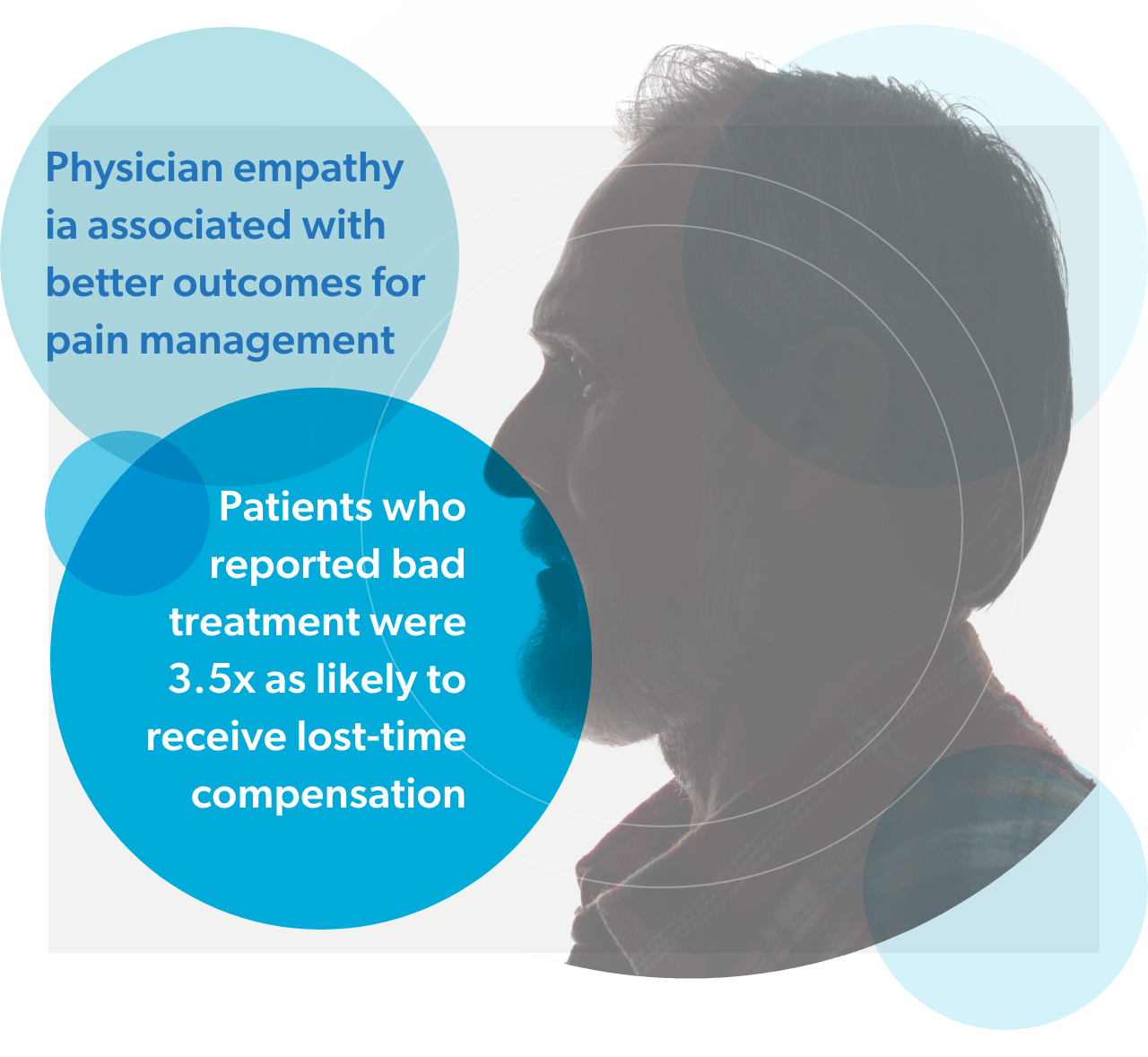Patient empathy has been a popular topic within the healthcare industry over the past two decades. As healthcare organizations began focusing on the patient ‘experience of care’ as a measure of success, demonstrating empathy became an important goal for individual healthcare professionals, as well as overall patient engagement programs.
In workers’ comp, there is increasing support for a more empathetic and patient-centric claims model, and with good reason. A poor claims experience is not simply a matter of dissatisfaction on the part of the injured worker. A strong correlation has been reported between the claims process experience and return to work status. According to one study, injured workers who had a negative or neutral claim experience were less likely to have returned to work than those who had a positive experience – 65% as compared to 84% – when controlling for all other factors.1 In addition, negative interactions during the claims process can cause or exacerbate psychosocial factors, which can impact worker health in both the short and long term.2
Although the degree of injury or illness can vary, the majority of employees who file workers’ compensation claims require medical attention and, therefore, become patients. And their experience as patients may be inferior to those covered by other types of insurance. According to a recent study, workers’ comp patients are less satisfied with their medical providers than other payer patients (including private insurance, Medicare and Medicaid) with 59% of workers’ comp patients saying they would recommend their providers, as compared to 79% of non-workers’ comp patients.3 And a recent Healthesystems’ study found that 60% of patients who had initial medical exams reported a negative provider experience.4

But medical providers are not the only driver of unsatisfactory patient experience. A review of multiple qualitative studies regarding injured workers’ interactions with employers, insurers, and healthcare providers found that a majority of injured workers experience negative interactions at every stage of the claims process.2 And approximately 70% of patients who were referred to specialists were satisfied with the care they received, but only 59% were satisfied with how that care was coordinated. 5
Traditionally defined as the ability to deeply understand another’s emotions and/or vicariously feel what another person is feeling, empathy is often seen as a personal characteristic that one either does or does not possess. But the Society for General Internal Medicine describes empathy in healthcare as: “the act of correctly acknowledging the emotional state of another without experiencing that state oneself.” 6 And that is a more helpful way to think of empathy as a mechanism for improving the patient experience.
Workers’ comp patients must navigate a complex system, which not only includes interactions with clinicians, but also claims professionals, case managers, and a variety of other individuals from multiple organizations. Not to mention a myriad of bureaucratic and legal requirements. So, for workers’ comp purposes, we might expand the definition of empathy to:

The act of correctly acknowledging and addressing the emotional state and practical needs of an injured worker without experiencing that state oneself
Every aspect of the claims process should support a full recovery and a timely return to work for injured employees. To be effective in workers’ comp, empathy must be converted into action and applied consistently across the entire claims experience, which includes:
Of course, not every injured worker is exposed to all of these actions and many experience only the first few. But there are steps within each step involving information gathering, investigations, prior authorizations, approvals, rejections, etc. that can pose challenges for patients. A recent study on the views of stakeholders regarding workers’ compensation policies and processes reported that injured workers experienced three primary challenges in the areas of claims processing and care delivery: excessive system navigation challenges; lack of integration with the rest of healthcare; and poor quality care/access and denial of care.7
Empathy can be incorporated into every part of the process by reviewing each component from the perspective of the patients and making decisions based on their needs. For example, here are three empathetic solutions offered by workers’ comp service providers to address the above challenges:
These are quite different programs, and only one of them involves direct interaction with patients, but they all have one thing in common: focus on the needs of the injured worker. Patient empathy is sometimes best demonstrated through programmatic improvements that make it easier for injured workers to take the right steps on their road to recovery.
As noted earlier, interpersonal empathy is subjective and emotional, and can be highly effective in one-to-one encounters. More comprehensive improvements to the patient experience requires a more systematic approach, which involves the entire organization including its:
We are in the early stages of incorporating deliberate, programmatic empathy in workers’ compensation, and most of the research to this point has focused on the impact of negative patient experiences. For example, injured workers who reported a negative treatment experience were 3.5 times as likely to receive time-loss compensation compared to patients who had a positive experience.5 Such statistics may provide their own incentives to consider an empathetic approach, but there is also some good evidence from the healthcare industry that empathy makes a difference.
A study of diabetic patients and their physicians found that 56% of the patients whose physicians had high empathy scores had good hemoglobin A1c levels, whereas only 40% of the patients whose physicians had low empathy scores had good A1c levels. A similar result was found for LDL-C levels with 59% of the patients in the high-empathy physician group having good levels as compared with 44% of the patients in the low-empathy physician group. 8
Even more relevant to workers’ compensation, a recent study found a significant positive correlation between physician empathy ratings and satisfaction among pain patients, concluding that “employing empathy in clinical practice will benefit patients via better clinical outcomes and overall decreased morbidity.” 9

The results of greater empathy in general healthcare are encouraging and should, of course, also benefit workers’ compensation patients. Employing an empathetic model to all aspects of the claims process could not only improve the injured workers’ experience, but health and organizational outcomes as well.
